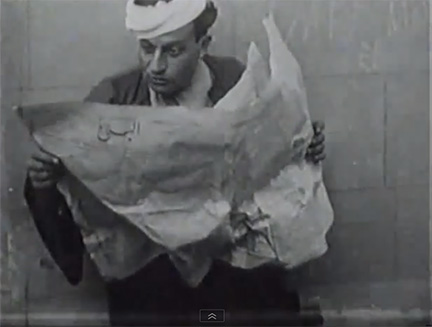
The first Egyptian silent film apparently appeared in 1923 under the title Barsoum Looking for a Job
برسوم يبØØ« عن وظيÙØ©
It is now on Youtube. It has poor, hungry Egyptians, lots of fighting, a dinner party and a drunken ending…

The first Egyptian silent film apparently appeared in 1923 under the title Barsoum Looking for a Job
برسوم يبØØ« عن وظيÙØ©
It is now on Youtube. It has poor, hungry Egyptians, lots of fighting, a dinner party and a drunken ending…
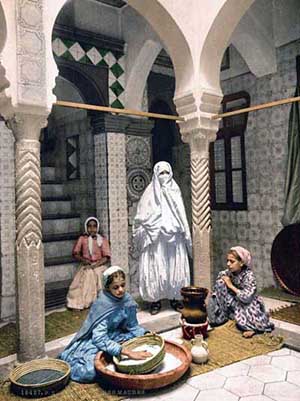
The photograph illustrates Luce Ben Aben, Moorish women preparing couscous, Algiers, Algeria.
There is a trove of old photographs from around the Middle East at the website http://www.azerbaijanrugs.com/oldphotos/old-photographs-me.htm

Kurds in national costumes
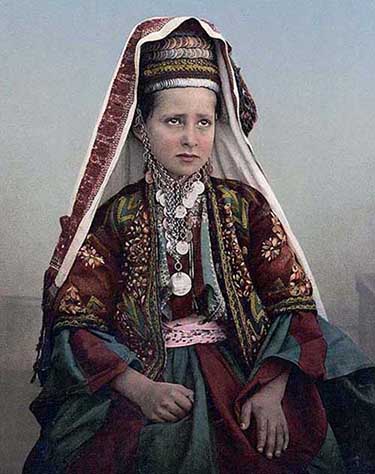
Young girl of Bethlehem. This color photochrome print was made between 1890 and 1900.
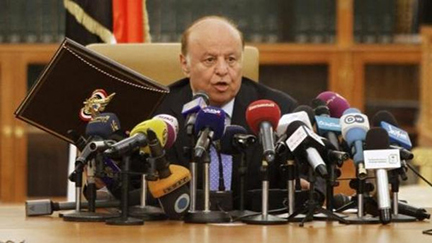
President Hadi, who is currently governing from Aden
Yemen’s legitimacy crisis is not new but is critical
By: Sama’a al-Hamdani, al-Araby al-Jadid, 3 March, 2015
On February 21, Yemen’s President Abd-Rabbo Mansour Hadi, escaped the Houthi-mandated house arrest and successfully fled to the southern city of Aden. A few hours later, al-Jazeera television broadcast a statement by the then resigned president. At the end of the statement, Hadi signed his name, “Abd-Rabbo Mansour Hadi, President of the Republic of Yemenâ€. It strongly suggested he had withdrawn his resignation.
So Yemen is now left arguably with two former presidents (Hadi and Ali Abdullah Saleh), a hugely powerful rebel militia leader (Abdulmalik al-Houthi), several secessionist movements (a couple of Southern Hiraks, a Marib Hirak and a Tihaman Hirak), UN-backed transitional committees, and two transitional agreements (The Gulf-Cooperation Council (GCC) transitional deal of 2011 and The Peace and Partnership Agreement of 2014).
In this confusion what, or rather, who, has legitimacy? Continue reading Yemen’s legitimacy crisis
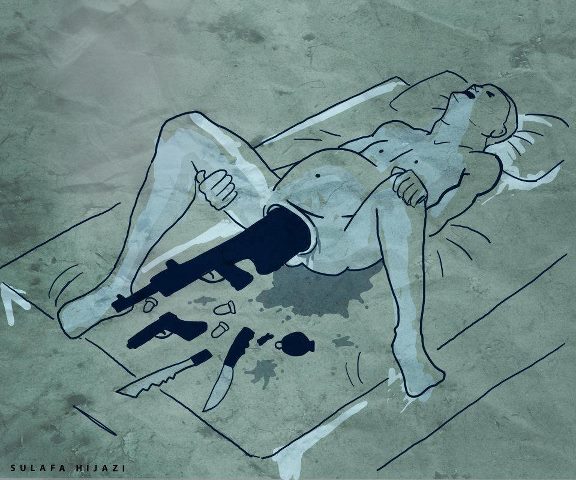
A painting that says it all by Sulafa Hijazi on Arab Women Artists.
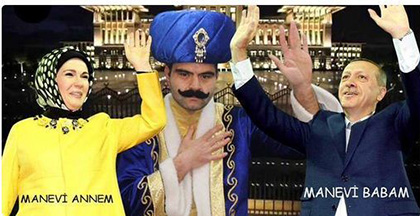
I don’t think you need a seismic detector anywhere in Turkey these days to determine if Mustafa Kamal Ataturk is not rolling over in his mausoleum in Ankara. The man who dragged Turkey so hard that the fez fell off and who de-scripted the calligraphically beautiful Ottoman language has been superseded by a leader no less contested, President and former Prime Minister Recep Tayyip ErdoÄŸan. ErdoÄŸan is a polarizing figure, imposing his will in much the same way that military-backed leaders have done in Turkey’s past. And the comparisons between him and the old line of sultans is in the air these days. Calling for mandatory learning of the old Ottoman script, no matter how appealing to academic Ottomanists, is suggestive of more than historical nostagia. Building a huge palace of some 1,150 rooms (there were only 1,001 nights in the Arabian Nights epic) at a cost of around 490 million euros ($615 million) and then deciding that it should be called a kulleye, with all the religious connotations this conjures in Turkey, is eyebrow-raising to say the least.
We are now entering the age of political Ottomanipulation in Turkey. The next election will see politicians topped off with turbans and probably handing out tulips to buy votes. New political ads have no need to be satirized, since no satire could improve on their critique. There is no danger of Turkey returning to the sublime porte; that sick man of Europe cannot be resurrected, especially by an admirer of the modern Muslim Brotherhood. The Islamic branding that ErdoÄŸan brandishes is thoroughly contemporary and metaphorical. Taking pride in the Ottoman past is the point, but in order to create a new kind of Islamic leadership. There is no room for a caliph in the modern world any more than for Italy to go back to its caesars (even if those were the salad days for my grandfather’s homeland). But if you want to gain as absolute power as you possible can, religion is the best way to go. If you happen to be president of Uzkekistan for over two decades it helps to have a first name of Islam. And if Tamerlane can be trussed up in modern propaganda in Uzbekistan, why not Sultan Suleiman the Magnificent.

Will it work? Will reading Ottoman script on mosque walls and watching politicians parade around in the old robes of authority convince the electorate that this is the best way to move forward? Time will tell, obviously, but in the mean time it may be useful to follow Turkey’s economic health. If Marx was around, I suspect he would argue that the jingle of coins in the pocket beats staring at museum objects. No fadish fetish beats the economy for predicting the probable direction of change.

When you watch an ISIS online video, remember who is the inspiration.
ISIS or Da’ash or whatever you want to call the latest reality internet show from the Middle East has an active propaganda machine right out of the playbook of Herr Goebbels. If it is not choreographed beheadings or other atrocities meant to cause terror, it is trying to efface and erase the past. The area that ISIS appears to have nominal control over is one of the most extensive archaeological mine fields in the world, with lots of object on display in museums. One of the latest videos is of the bashing of statues in the Mosul Museum. At first glance one can only shake one’s head (and perhaps use the index finger raised in an appropriate gesture) at such a destructive act. But as in all propaganda, the shame factor is the elephant in the display room. Fortunately for the real objects, the hammers are smithereening plaster casts for the most part. Unless ISIS slithers its way into Baghdad, which may require a Mahdi or two to accomplish, the real finds are safe thus far. This does not mean that there has not been irreplaceable damage done to historical objects and sites already.
The current game plan of the primary actors in the conflict, apart from those who seem to delight in mayhem, is to bomb ISIS one pick-up truck at a time and to drone in on leaders from satellite data. This may take some time, no matter how many planes are sent on missions over a rather vast stretch of territory. Some day the local armies on “our” side will have sufficient training and resources (to replenish those taken without much resistance by ISIS) to go in and battle the militants directly. In the meantime (and it is a very mean time indeed), another major front is the propaganda war broadcast digitally. The toppling of a plaster cast of Ashurbanipal, the long-dead Assyrian king, is not likely to bring any converts to Islam, but it may resonate with disaffected youth who see a chance to leave their video game warcraft and get a taste of the “real” thing. I do not think those of us who are appalled by such acts need to watch these intentionally propagandic videos. They are meant to fan the flames of Islamophobia and thus to attract more radicals. The best way to counter such propaganda is not to make an issue out of it, which is the Fox News feed-the-hate approach. It helps to expose the artificiality of it, but that is secondary.
In videos like the one on the Mosul Museum bashing I recommend calculated not benign neglect. I debated whether to even write this post, as I have certainly had enough of the mountain of commentary on ISIS already. If you do watch the video, know what you are seeing and why the makers want you to see it. And remember who the real inspiration is behind such outrageous outreach. But if you can avoid seeing it altogether, the propaganda value may be diminished by at least one person at a time.
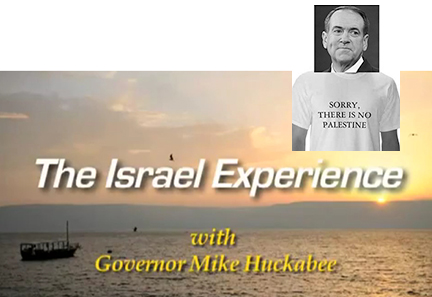
The Republican Party, inebriated with tea partisanship, seems to shoot itself in its elephantine trunk in attracting presidential candidates. This certainly worked to Romney’s favor last time around, as he certainly looked far more presidential than “what-was-the-third-one” Rick Perry, Call 999 and pay your taxes Mr. Cain, Sarah “I can see Alaska from my bedroom” Palin, Ron “I will run even when I am in my grave” Paul and the other circus acts that paraded through the primaries in 2012. Once again we are seeing a run (at the mouth some times) of former Governor and Fox News celebrity Mike Huckabee. He is apparently willing to overlook the fact that having two presidents from the state of Arkansas within only a couple of decades is going against Las Vegas odds. But here he is again, hitting the mash potato and Bible verse quoting circuit and about as Iowa bound as a candidate can get.
The latest bit of Huckabeeswax has a nasty sting to it. Echoing the Gold Meir canard that there are no “Palestinians” on his most recent Bible Land tour (I suspect that Huckabee is guilty of not reading Twain’s Innocents Abroad), the Arkansas traveler said that there aint no such thing (well he is reported to have said “is” no such thing but who knows what the meaning of “is” really is) as a Palestinian. “The idea that they have a long history, dating back hundreds or thousands of years, is not true,” Huckabee said.
So if there are no “Palestinians” but only “Arabs” who made up the term to spite Israel and drive them into the sea, who exactly was living in Eretz Israel before 1948. Here are some scenarios. Continue reading Huckabeeswax

This stupidity needs to end: Why the Atlantic & NY Post are clueless about Islam
Pundits claiming that ISIS is emblematic of Islam ignore the intellectual traditions at the heart of the religion
by H.A. Hellyer, Salon, Februrary 20, 2015
This week, President Obama hosted a summit on countering “violent extremism,†where he received criticism from some on the rightwing over his refusal to call such violence “Islamic.†American media outlets, particularly the Atlantic and the New York Post, have struck a similar chord of late. All of this happens against a rather poignant backdrop: Only a few days ago, ISIS released a video showing the killing of 21 Coptic Egyptians in Libya. The group expressed what it considered to be Islamic justification for its actions. Long after the summit, specialists in the field of counter-extremism will continue to ask the question: Is ISIS actually representative in some way of Islam? And what, really, is the relationship between the group that calls itself the “Islamic State†and the world’s second largest religion?
There will be those that will insist that ISIS has nothing to do with Islam or religion in general — that ISIS is primarily a social and political phenomenon, bereft of ideology entirely, or simply using Islam as a superficial justification. Counterterrorism studies indicate that for very many people in the broader radical Islamist universe, non-ideological factors certainly play magnificently important roles. At the same time, it is also the case that for radical Islamists, an ideological component not only exists, but is crucial in understanding their world views. In some shape or form, for ISIS supporters, religion certainly plays a role. But what religion, precisely?
The easy answer is to say “Islam†– but it is also a rather lazy answer. There are around 1.5 billion Muslims around the world. The vast, overwhelming majority of them, needless to say, are not members of ISIS — and, in fact, Muslims actually make up the majority of ISIS’s victims, its most active enemies on the battlefield, and its most prominent detractors. Continue reading This stupidity needs to end